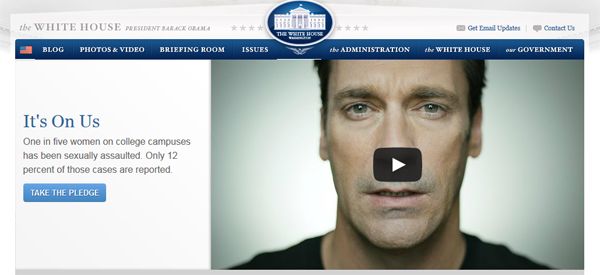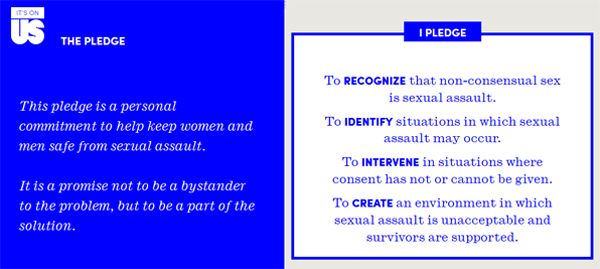Today, President Obama officially rolled out the "It's On Us" campaign, which is part of his administration's focus on preventing sexual assault on college campuses.
The President gave an introductory address (I'll come back to that), and a PSA released earlier this week is now prominently featured on the front page of WhiteHouse.gov:

The PSA features a collection of celebrities, as well as the President and Vice-President, laying out the basic principles of the "It's On Us" campaign: "It's on us to stop sexual assault; to get in the way before it happens; to get a friend home safe; to not blame the victim; it's on us to look out for each other; to not look the other way; it's on us to stand up; to step in; to take responsibility; it's on us, all of us, to stop sexual assault. Learn how, and take the pledge, at it's on us dot org."
This is the pledge found at the referenced website:

Two things to note at this point:
1. The campaign is very focused on bystander intervention, despite the fact that many anti-rape activists (myself among them) have repeatedly communicated, at each stage of their campus rape prevention action plan, that an emphasis on bystander intervention is problematic for multiple reasons. Instead of listening to these concerns, the White House has now rolled out an entire campaign centered explicitly around intervention.
2. In neither the PSA nor the pledge is anyone asked to not rape. "It's on us" to stop sexual assault—and yet sexual assault is being discussed as though it's just something that happens to people, like a natural disaster. This rape prevention campaign doesn't even include rapists in its messaging about personal accountability for preventing rape. Instead, it's directed at everyone but rapists. Now, not just victims are tasked with the responsibility to prevent rape; but everyone is. Everyone except rapists.
An effective rape prevention campaign shouldn't double-down on the sinister rape culture narrative that rapists aren't accountable for rape.
Further, to write rapists and potential rapists out of the messaging, to fail to include simple and straightforward language like, "It's on us to not rape other people," the campaign suggests that rapists are outside of us, other than us, strangers lurking in the dark and waiting to harm us. This, despite the fact that a woman on a college campus is more likely to be assaulted by the friend who walks her home than the proverbial stranger who jumps out of the bushes.
I hoped that the President's address might be better, but, alas, this is the closest he ever comes to saying "it's on us to not rape":
This is not just the work of survivors, it's not just the work of activists. It's not just the work of college administrators. It's the responsibility of the soccer coach, and the captain of the basketball team, and the football players. And it's on fraternities and sororities, and it's on the editor of the school paper, and the drum major in the band. And it's on the English department and the engineering department, and it's on the high schools and the elementary schools, and it's on teachers, and it's on counselors, and it's on mentors, and it's on ministers.Some of this, as well as other parts of the speech, are really good, and I'm very glad that our President is saying them.
It's on celebrities, and sports leagues, and the media, to set a better example. It's on parents and grandparents and older brothers and sisters to sit down young people and talk about this issue.
And it's not just on the parents of young women to caution them. It is on the parents of young men to teach them respect for women. And it's on grown men to set an example and be clear about what it means to be a man.
It is on all of us to reject the quiet tolerance of sexual assault and to refuse to accept what's unacceptable. And we especially need our young men to show women the respect they deserve, and to recognize sexual assault, and to do their part to stop it. Because most young men on college campuses are not perpetrators. But the rest—we can't generalize across the board. But the rest of us can help stop those who think in these terms and shut stuff down. And that's not always easy to do with all the social pressures to stay quiet or go along; you don't want to be the guy who's stopping another friend from taking a woman home even if it looks like she doesn't or can't consent. Maybe you hear something in the locker room that makes you feel uncomfortable, or see something at a party that you know isn't right, but you're not sure whether you should stand up, not sure it's okay to intervene.
And I think Joe said it well—the truth is, it's not just okay to intervene, it is your responsibility. It is your responsibility to speak your mind. It is your responsibility to tell your buddy when he's messing up. It is your responsibility to set the right tone when you're talking about women, even when women aren't around—maybe especially when they're not around.
And it's not just men who should intervene. Women should also speak up when something doesn't look right, even if the men don't like it. It's all of us taking responsibility. Everybody has a role to play.
But shit like this? "And it's not just on the parents of young women to caution them. It is on the parents of young men to teach them respect for women. And it's on grown men to set an example and be clear about what it means to be a man." Is spectacularly unhelpful.
Young women don't need to be cautioned. Lots of "grown men" think that sexually assaulting women is part of "what it means to be a man." And teaching young men respect for women is crucial, but explicitly telling them not to rape is even more important.
In fact, it may well be the most important thing we can do—to say, in plain language, over and over and over again, don't rape people.
So why is that the very last thing that anyone seems to want to do?
[Related Reading: Not Alone; Quote of the Day; No More; No More, Again.]




Shakesville is run as a safe space. First-time commenters: Please read Shakesville's Commenting Policy and Feminism 101 Section before commenting. We also do lots of in-thread moderation, so we ask that everyone read the entirety of any thread before commenting, to ensure compliance with any in-thread moderation. Thank you.
blog comments powered by Disqus